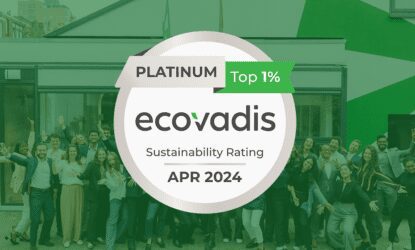 Top EcoVadis consultants: Your guide to choosing the best partner
Top EcoVadis consultants: Your guide to choosing the best partner
“EcoVadis is a valuable platform for cooperation across the supply chain, fostering stronger partnerships and facilitating the development of a more sustainable economy.”
With the majority of corporate greenhouse gas (GHG) emissions coming from sources not controlled by the reporting company, i.e. Scope 3 it’s clear that sustainable supply chain management is key to managing your organisation’s environmental impact.
However, standards of data collection and regulatory compliance can often vary across the value chain – making it difficult to gain clarity on how your partners contribute to your company’s environmental impact. The EcoVadis medal system can provide a solution.
Read on to discover the benefits of asking your suppliers to complete an EcoVadis assessment, how to manage the process and how to interpret the results.
Why request an EcoVadis assessment from your supplier?
As discussed in our previous blog, EcoVadis is one of the world’s most popular frameworks for assessing the effectiveness of corporate sustainability management systems. Indeed, more than 130,000 organisations worldwide currently have an EcoVadis rating. In addition, procurement teams at over 1,200 multinational companies use EcoVadis ratings to guide their purchasing decisions.[2]
Why is EcoVadis so popular for procurement managers?
Quite simply, it offers an accessible framework that gives a comprehensive insight into the sustainability maturity of suppliers. And given the growing regulatory scrutiny around the sustainability of companies’ supply chains, these insights can be key from a compliance perspective.
Indeed, companies such as DHL, Merck and Brenntag are already using the EcoVadis assessment to streamline compliance with the German Supply Chain Due Diligence Act (LkSG).[3]
And with supply chain scrutiny increasing across Europe,[4] identifying and addressing suppliers’ sustainability risks will continue to be a high priority for many.
How does the EcoVadis assessment process work?
The EcoVadis assessment is designed to provide a comprehensive evaluation of a company’s sustainability management system.
Ratings (and medals) depend on the company’s performance in four themes: Environment, Labour and Human Rights, Ethics and Sustainable Procurement. Within these, several sub-topics are selected for each company, depending on factors such as industry, size, location and activities.
This ensures that only the most relevant aspects of sustainability management are measured. Examples of sub-topics include biodiversity, customer health and safety, and corruption. Following the assessment process, each company receives a final score out of 100. This is based on a weighted average of the scores across all four themes.
Check out this blog to learn more about the EcoVadis assessment process.
What do the EcoVadis Medals mean?
Depending on the score a company receives, it may be awarded an EcoVadis Medal – ranging from Bronze to Platinum – in recognition of its sustainability management performance. This provides a simple method for buyers to benchmark suppliers, enabling them to streamline procurement decisions based on sustainability criteria.
In 2024, a company needed to achieve an EcoVadis score of 58 to receive a Bronze Medal and 81 to receive a Platinum Medal.
However, if a company scores below 30 in any one of the four key themes, it won’t be eligible for a medal. The medal thresholds are regularly reviewed and raised in line with the performance of all companies assessed. This makes the medals more useful for comparing companies’ performance with that of their peers.
What does it take to achieve an EcoVadis Gold Medal?
Only the top 5% of all companies assessed by EcoVadis are awarded the Gold Medal. In 2024, this means scoring 73 out of 100 on your EcoVadis Scorecard.
To achieve this, you’ll need to meet and exceed the criteria for Bronze and Silver, taking a much more detailed approach to sustainability management. This includes integrating sustainability into your wider business strategy, and holistically measuring and monitoring your progress.
For more information on how to achieve the EcoVadis Gold Medal, check out this blog.
What does it take to achieve an EcoVadis Platinum Medal?
Achieving Platinum means showing a consistent dedication to excellence in sustainability management. This requires you to prove that you have a comprehensive set of policies and targets in place covering all your company’s relevant environmental and social sub-topics – with purpose informing all aspects of your operations.
Find out more about achieving an EcoVadis Platinum Medal here.
Can I set EcoVadis score requirements for my suppliers?
Sometimes, when companies ask their value chain partners to complete the EcoVadis assessment, they’ll also attach a specific score requirement. For example, a buyer may require all suppliers to have an EcoVadis Gold Medal as a condition of doing business.
If a supplier is assessed and does not achieve the required score, the buyer can ask for an immediate reassessment. This gives the assessed company an opportunity to reevaluate its sustainability management approach and implement the necessary changes.
The good news is that over 80% of companies assessed improved their score following a reassessment.[5]
However, to ensure that your company meets the threshold required by the buyer, it’s important to gain clarity on the strengths and weaknesses of your organisation’s sustainability management approach. An external consultant, such as Nexio Projects, can simplify this process by conducting a detailed assessment of your company’s sustainability management system and highlighting areas for improvement.
EcoVadis ratings: Best practices for supplier engagement
The EcoVadis assessment provides a valuable platform for starting conversations with suppliers about their sustainability management practices – and for bringing transparency to buyers’ supply chains. However, the process of gaining stakeholder buy-in can sometimes be complex if suppliers aren’t familiar with EcoVadis or are unsure of why they’re being asked to complete the assessment. It’s therefore important to build a solid foundation of understanding before sending out the assessment request.
You can do this through proactive measures such as supplier training programmes or knowledge-sharing sessions designed to highlight the mutual benefits of the assessment. For example, many suppliers will be subject to legislation such as the EU’s Corporate Sustainability Reporting Directive (CSRD). And research has shown that a higher EcoVadis score correlates with greater preparedness for compliance with the GRI Standards – which have significant overlap with the CSRD.[6] [7] So, while collecting and consolidating sustainability management data can be time-consuming, putting frameworks in place now can greatly streamline future reporting processes.
How can suppliers improve their EcoVadis score?
Another key benefit for suppliers is that the EcoVadis assessment provides expert guidance to help them improve their sustainability management practices. All companies that complete the assessment receive an EcoVadis Scorecard with a detailed evaluation of their strengths and weaknesses, as well as strategies to accelerate their progress. These can help both to target a better EcoVadis score and to improve customer relationships, increasing suppliers’ chances of becoming a preferred partner for buyers.
Building supply chain resilience by increasing transparency
As we’ve seen, the EcoVadis assessment has numerous benefits for both buyers and suppliers. And the medal system is a great way to demonstrate progress on sustainability commitments. But beyond the commercial benefits of the assessment, the positive impact of EcoVadis goes much further. By providing a comprehensive framework for companies to navigate, assess and address risks across industries, it creates a valuable platform for improving dialogue and cooperation across the supply chain – fostering stronger partnerships and facilitating the development of a more sustainable economy.
Want to find out more about getting support with your EcoVadis assessment? Visit our EcoVadis Assessment service page today for more information.
[1] Hadziosmanovic, M., Rahimi, K. and Bhatia, P. (2022) Trends show companies are ready for Scope 3 reporting with US Climate Disclosure Rule, World Resources Institute. Available at: https://www.wri.org/update/trends-show-companies-are-ready-scope-3-reporting-us-climate-disclosure-rule (Accessed: 09 October 2024).
[2] Suppliers (2024) EcoVadis. Available at: https://ecovadis.com/suppliers/ (Accessed: 10 October 2024).
[3] Supply Chain Sustainability Regulations: How DHL Group, Brenntag, and Merck comply with confidence (2023) EcoVadis. Available at: https://resources.ecovadis.com/buyers/supply-chain-sustainability-regulations-how-dhl-group-brenntag-and-merck-comply-with-confidence (Accessed: 10 October 2024).
[4] Suppliers outline how they keep up with Sustainability Rules (2024) World Economic Forum. Available at: https://www.weforum.org/agenda/2024/09/supply-chain-sustainability-changing-regulation/ (Accessed: 10 October 2024).
[5] EcoVadis Ratings (2024) EcoVadis. Available at: https://ecovadis.com/solutions/ratings/ (Accessed: 09 October 2024).
[6] A surprising number of companies are approaching CSRD reporting readiness, Data says (2024) Sustainable Procurement and Supply Chain Resources. Available at: https://resources.ecovadis.com/blog/a-surprising-number-of-companies-are-approaching-csrd-reporting-readiness-data-says (Accessed: 10 October 2024).
[7] Efrag and GRI launch interoperability index (2023) XBRL. Available at: https://www.xbrl.org/news/efrag-and-gri-launch-interoperability-index/ (Accessed: 10 October 2024).











